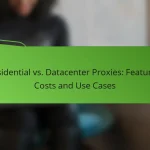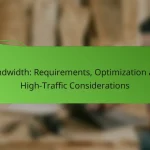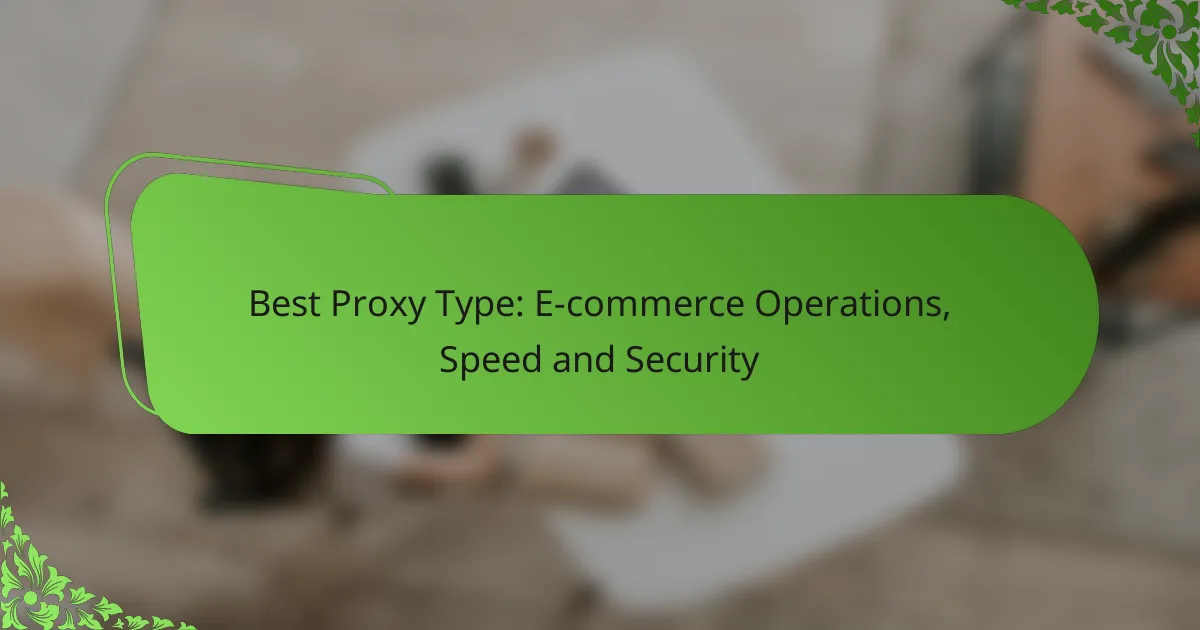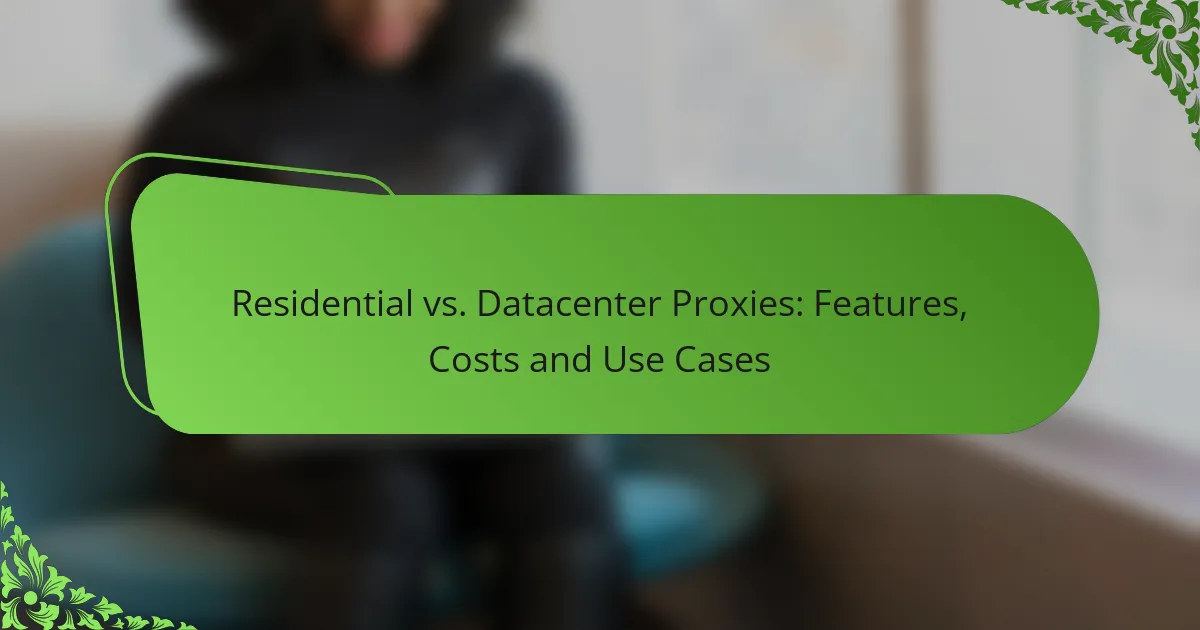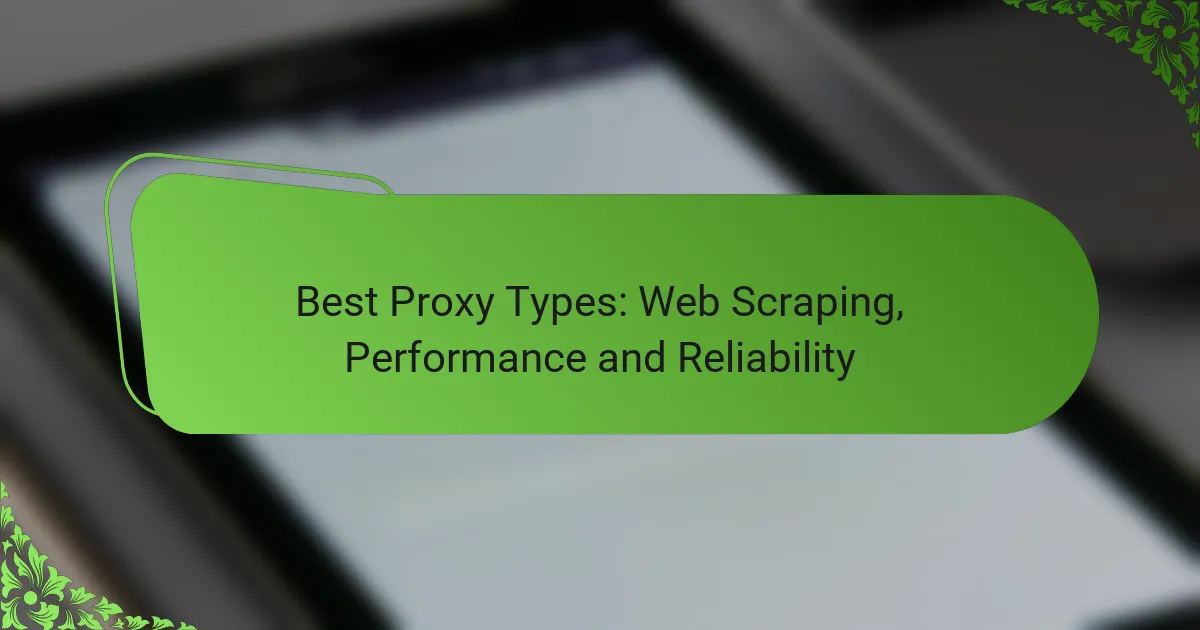In the realm of e-commerce, choosing the right proxy type is crucial for optimizing operations, enhancing speed, and ensuring security. Residential, datacenter, and mobile proxies each provide unique benefits that cater to various needs, from web scraping to account management. By acting as intermediaries, proxies not only improve data transfer speeds but also protect sensitive information, creating a safer online shopping environment.
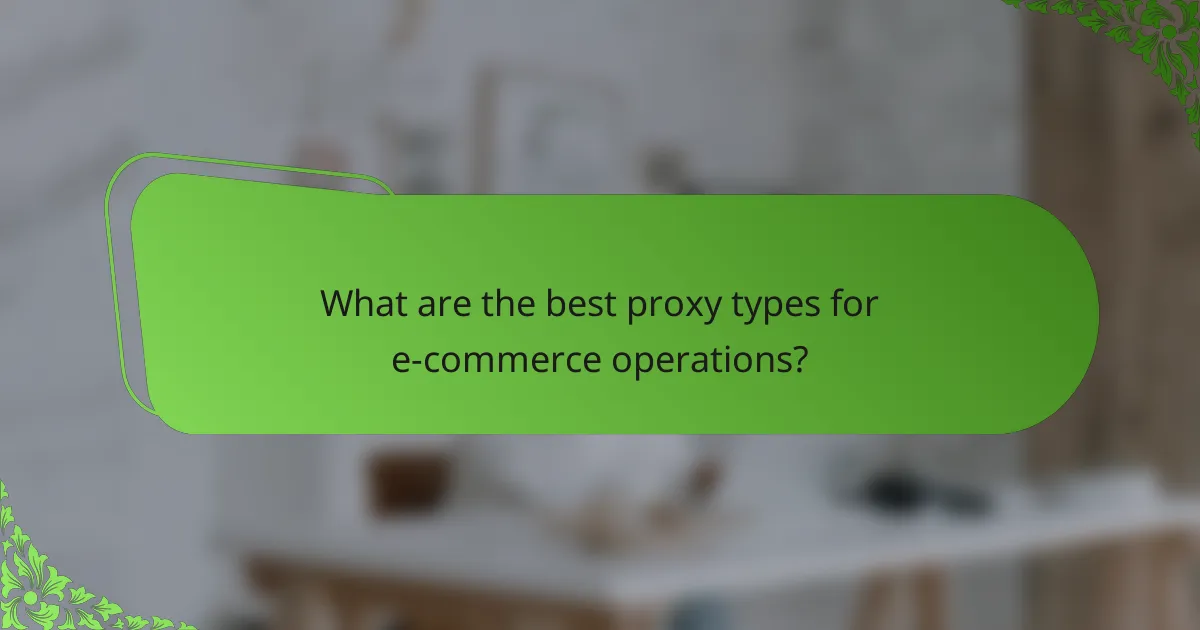
What are the best proxy types for e-commerce operations?
The best proxy types for e-commerce operations include residential, datacenter, and mobile proxies. Each type offers distinct advantages in terms of speed, security, and reliability, making them suitable for various online activities such as web scraping, account management, and competitive analysis.
Residential proxies
Residential proxies are IP addresses assigned to real devices, making them appear as legitimate users. This type of proxy is ideal for e-commerce as it helps bypass geo-restrictions and reduces the risk of being blocked by websites. They are particularly useful for tasks like price monitoring and ad verification.
When using residential proxies, consider the provider’s network size and reliability. A larger pool of IPs can help distribute requests, minimizing detection. However, they may come at a higher cost compared to other proxy types, typically ranging from $10 to $50 per month per IP.
Datacenter proxies
Datacenter proxies are not affiliated with Internet Service Providers (ISPs) and are instead hosted on servers in data centers. They offer high speed and lower costs, making them suitable for tasks that require quick data retrieval. However, they are easier to detect, which can lead to blocks during sensitive operations.
For e-commerce, datacenter proxies can be effective for bulk data scraping or automated tasks. Pricing is generally more affordable, often between $1 to $5 per month per IP. Ensure to rotate IPs frequently to avoid detection and maintain access to targeted websites.
Mobile proxies
Mobile proxies use IP addresses from mobile devices, making them highly effective for mimicking real user behavior. This type of proxy is particularly useful for e-commerce operations that require interaction with mobile apps or websites, as they reduce the likelihood of being flagged or banned.
Mobile proxies tend to be more expensive, usually costing between $20 to $100 per month per IP. They are ideal for tasks like testing mobile ads or managing social media accounts. When selecting a mobile proxy provider, prioritize those with a large pool of IPs to ensure better performance and reliability.
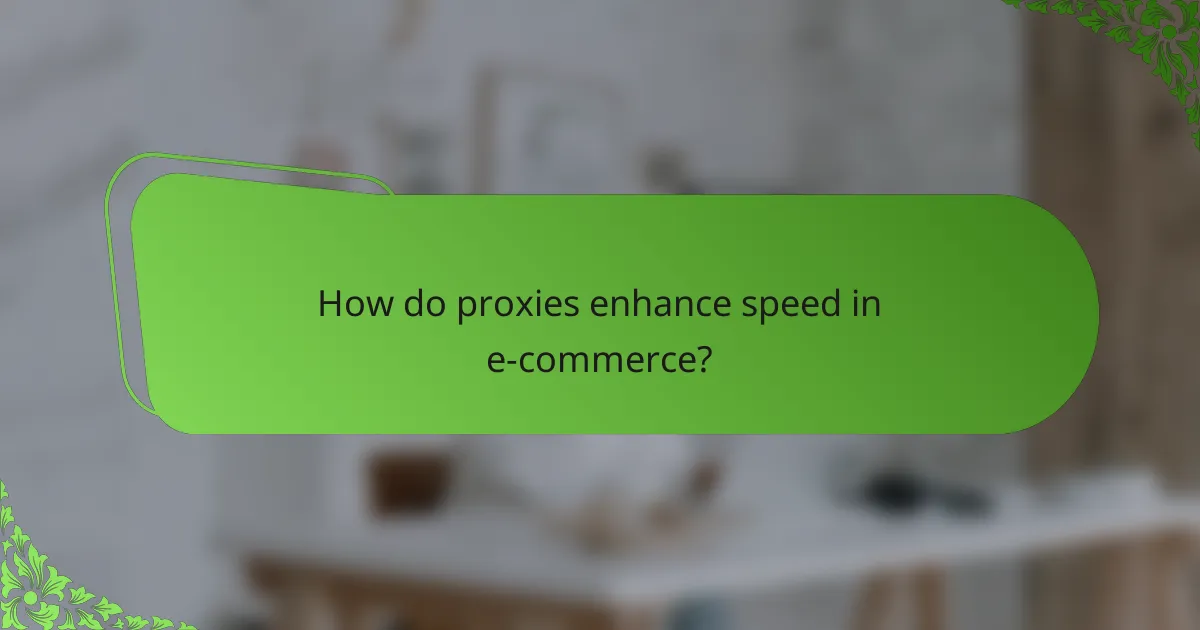
How do proxies enhance speed in e-commerce?
Proxies significantly enhance speed in e-commerce by optimizing data transfer and reducing delays. They act as intermediaries between users and servers, improving response times and ensuring smoother transactions.
Reduced latency
Reduced latency is crucial for e-commerce operations, as it directly impacts how quickly users can access websites and complete purchases. Proxies can minimize latency by caching frequently accessed data and serving it from a closer location, which decreases the time it takes for data to travel over the internet.
For instance, a proxy server located geographically closer to the user can deliver content faster than a distant server. This reduction in latency can lead to improved customer satisfaction and potentially higher conversion rates.
Load balancing
Load balancing is another way proxies enhance speed in e-commerce by distributing incoming traffic across multiple servers. This prevents any single server from becoming overwhelmed, which can cause slowdowns or crashes during peak shopping times.
By efficiently managing traffic, proxies ensure that users experience consistent performance even when demand spikes, such as during holiday sales or special promotions. Implementing load balancing can significantly enhance the reliability and speed of e-commerce platforms.
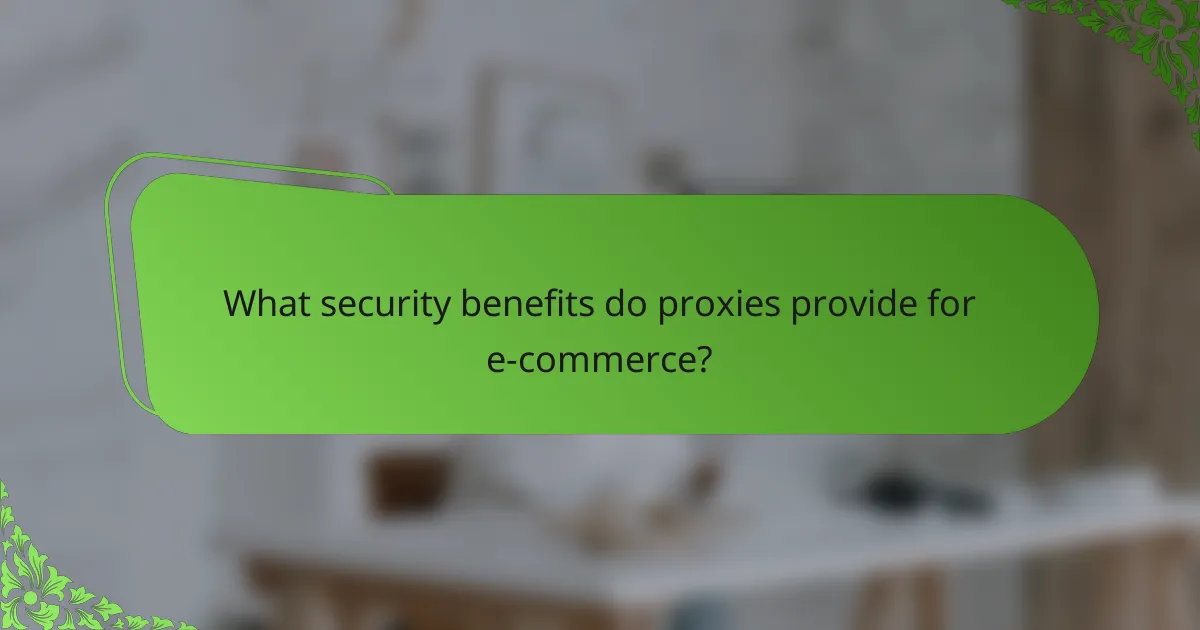
What security benefits do proxies provide for e-commerce?
Proxies enhance security for e-commerce operations by acting as intermediaries between users and the internet, which helps protect sensitive data and maintain anonymity. They can mitigate risks associated with data breaches, cyberattacks, and unauthorized access, ensuring a safer online shopping experience.
IP masking
IP masking is a crucial security feature of proxies that hides the real IP address of e-commerce servers. By routing traffic through a proxy server, businesses can prevent malicious actors from identifying their actual location, reducing the risk of targeted attacks.
For e-commerce sites, using IP masking can help in avoiding geo-restrictions and accessing region-specific content. This is particularly beneficial for companies operating in multiple countries, as it allows them to maintain a consistent online presence without revealing their true IP addresses.
DDoS protection
DDoS (Distributed Denial of Service) protection is another significant advantage of using proxies in e-commerce. Proxies can absorb and distribute incoming traffic, preventing overwhelming amounts of requests from crashing the server. This ensures that legitimate customers can access the site even during an attack.
Implementing a proxy with DDoS protection can be a cost-effective measure for e-commerce businesses, as it helps maintain uptime and customer trust. Regularly monitoring traffic patterns and employing scalable proxy solutions can further enhance resilience against such attacks.

Which proxy providers are best for e-commerce in the US?
For e-commerce operations in the US, Bright Data and Smartproxy stand out as top proxy providers. They offer robust solutions tailored for speed and security, essential for managing online transactions and data scraping without compromising performance.
Bright Data
Bright Data, previously known as Luminati, is renowned for its extensive proxy network, which includes residential, data center, and mobile proxies. This variety allows e-commerce businesses to choose the best type of proxy based on their specific needs, such as bypassing geo-restrictions or ensuring anonymity during data collection.
One key advantage of Bright Data is its high-speed connections and reliability, which can significantly enhance the efficiency of web scraping and competitive analysis. However, the pricing can be on the higher end, so businesses should assess their budget against the expected return on investment.
Smartproxy
Smartproxy offers a user-friendly interface and a large pool of residential IPs, making it an excellent choice for e-commerce operations. Its flexible pricing plans cater to various business sizes, allowing small to medium enterprises to access quality proxy services without breaking the bank.
With Smartproxy, users benefit from fast connection speeds and a straightforward setup process. However, while it provides solid performance, some users may find limitations in the number of simultaneous connections compared to more premium services like Bright Data. It’s advisable to evaluate your specific needs to choose the right plan.
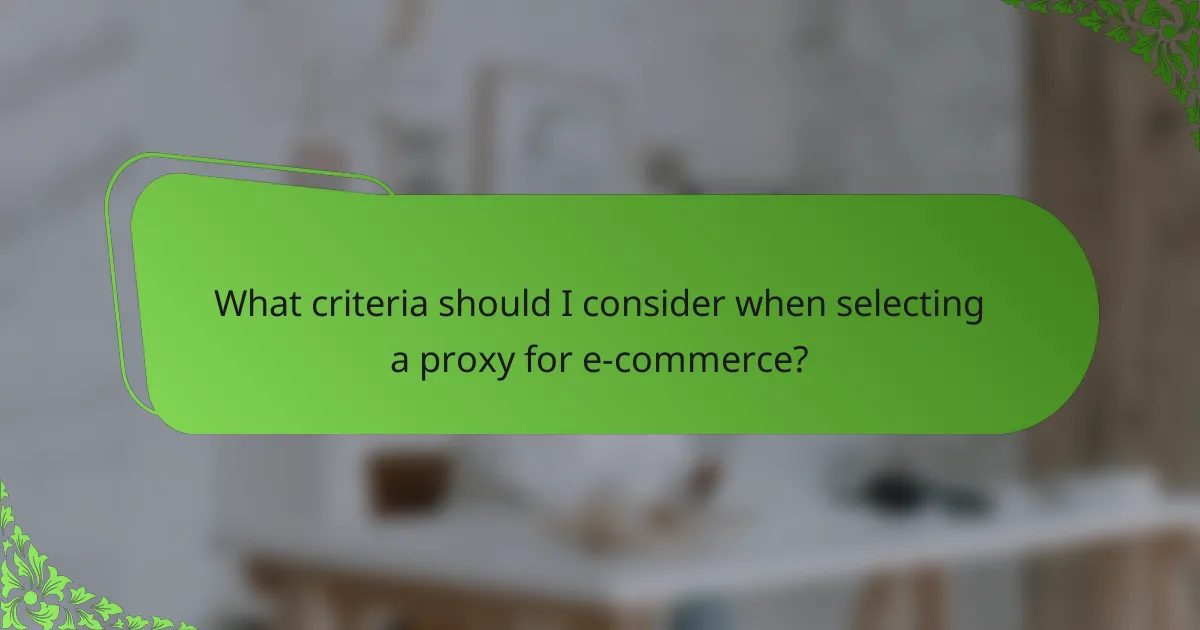
What criteria should I consider when selecting a proxy for e-commerce?
When selecting a proxy for e-commerce, consider factors such as speed, security features, and cost-effectiveness. These elements are crucial for ensuring smooth operations, protecting sensitive data, and maintaining profitability.
Speed and performance
Speed and performance are vital for e-commerce proxies, as they directly impact the user experience. Look for proxies that offer low latency, ideally in the low tens of milliseconds, to ensure quick page loads and seamless transactions.
Additionally, consider the bandwidth provided by the proxy service. High bandwidth allows for faster data transfer, which is particularly important during peak shopping times or flash sales. Aim for proxies that can handle multiple simultaneous connections without significant slowdowns.
Security features
Security features are essential for protecting sensitive customer information and maintaining trust. Choose proxies that offer strong encryption protocols, such as HTTPS, to safeguard data during transmission.
Also, consider proxies with built-in features like IP rotation and anonymity. These can help prevent tracking and reduce the risk of DDoS attacks, which are common threats in the e-commerce space. Ensure the provider complies with relevant data protection regulations, such as GDPR, to further enhance security.
Cost and scalability
Cost and scalability are important factors when selecting a proxy for e-commerce operations. Evaluate the pricing structure of different proxy services, looking for options that fit your budget while providing the necessary features. Some providers offer tiered pricing based on usage, which can be beneficial for growing businesses.
Scalability is crucial as your e-commerce operations expand. Choose a proxy service that allows you to easily upgrade your plan or add more IP addresses as needed. This flexibility ensures that your proxy can grow alongside your business without requiring a complete overhaul.
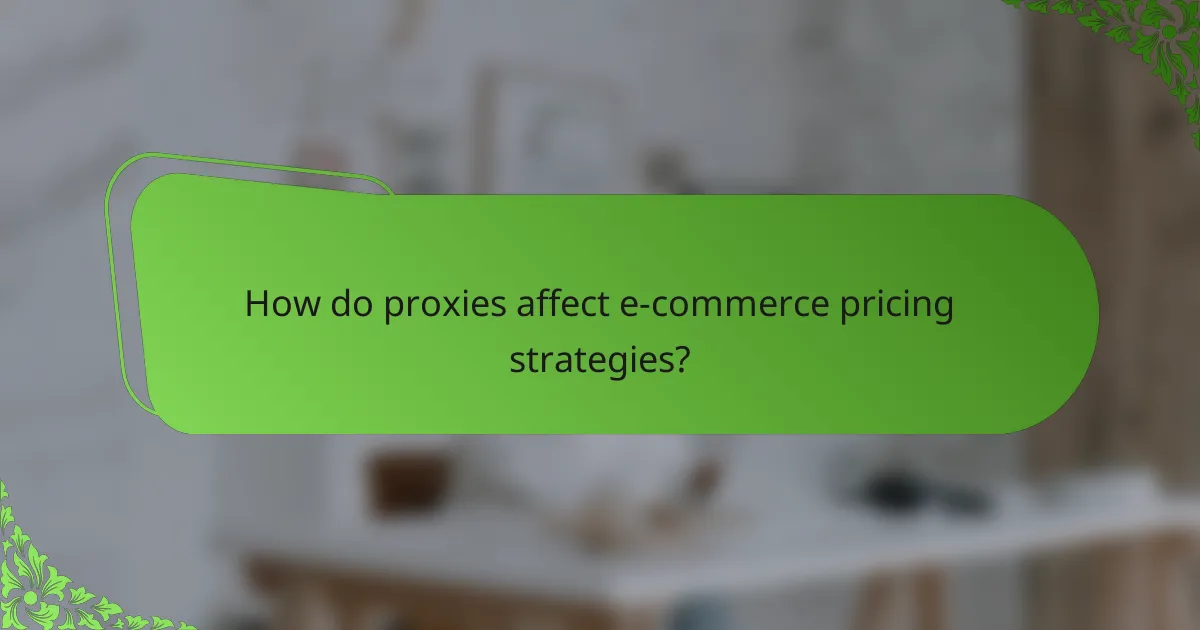
How do proxies affect e-commerce pricing strategies?
Proxies can significantly influence e-commerce pricing strategies by enabling businesses to gather competitive pricing data and analyze market trends. By using proxies, companies can access information from various regions and competitors without being blocked or limited by geographical restrictions.
Market analysis
Market analysis in e-commerce involves evaluating competitors’ pricing, product availability, and promotional strategies. Proxies allow businesses to scrape data from competitor websites anonymously, ensuring they can track price changes and market trends effectively.
When conducting market analysis, consider using residential proxies for better reliability and access to localized pricing. This approach can help identify pricing patterns and consumer behavior across different regions, leading to more informed pricing strategies.
Additionally, avoid relying solely on a single data source. Cross-referencing information from multiple competitors can provide a more comprehensive view of the market landscape, helping to refine your pricing tactics and promotional offers.
